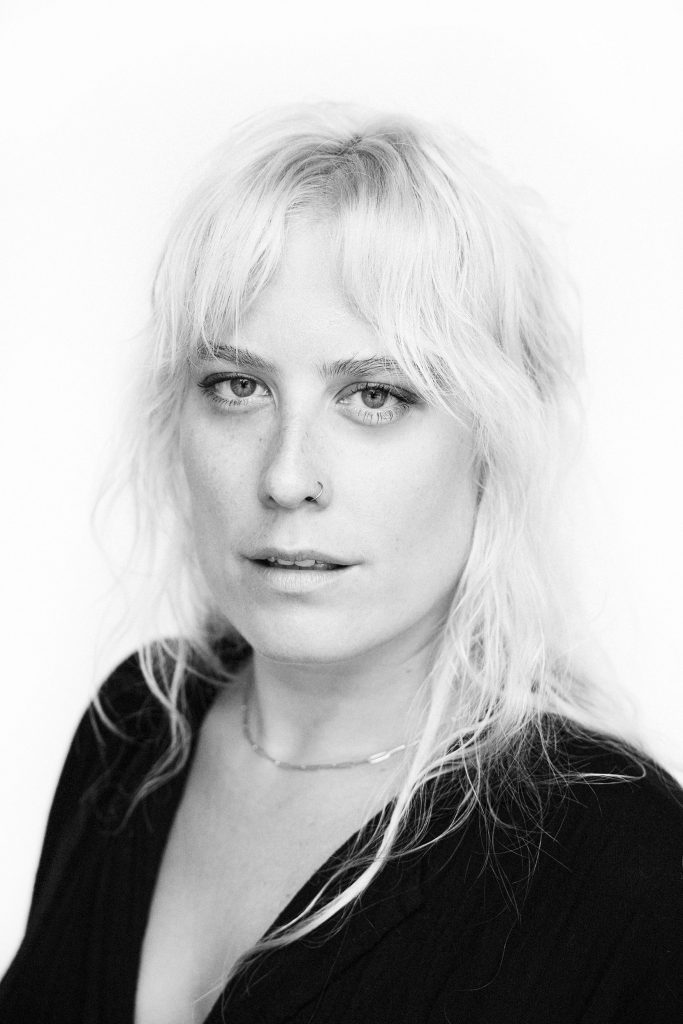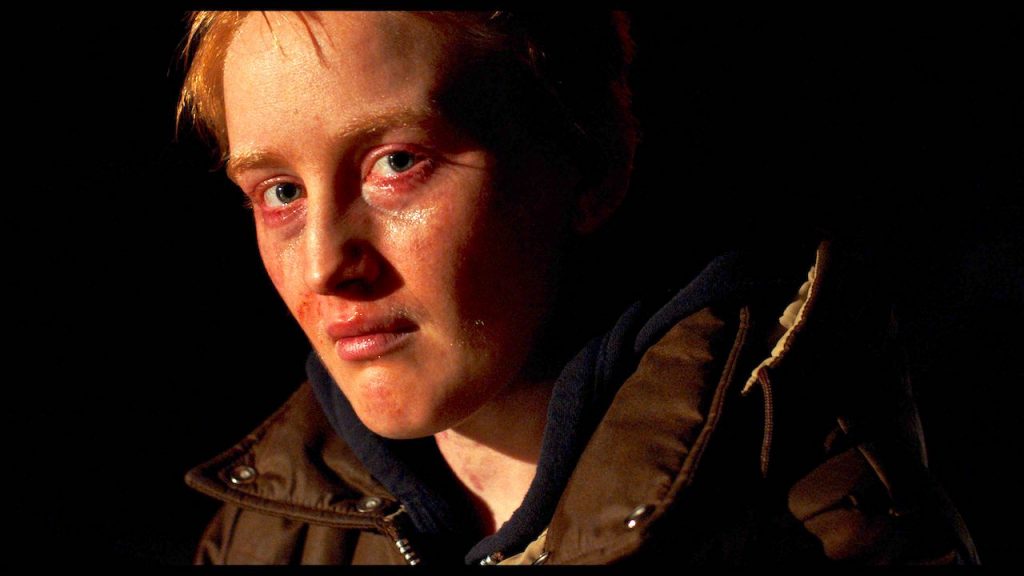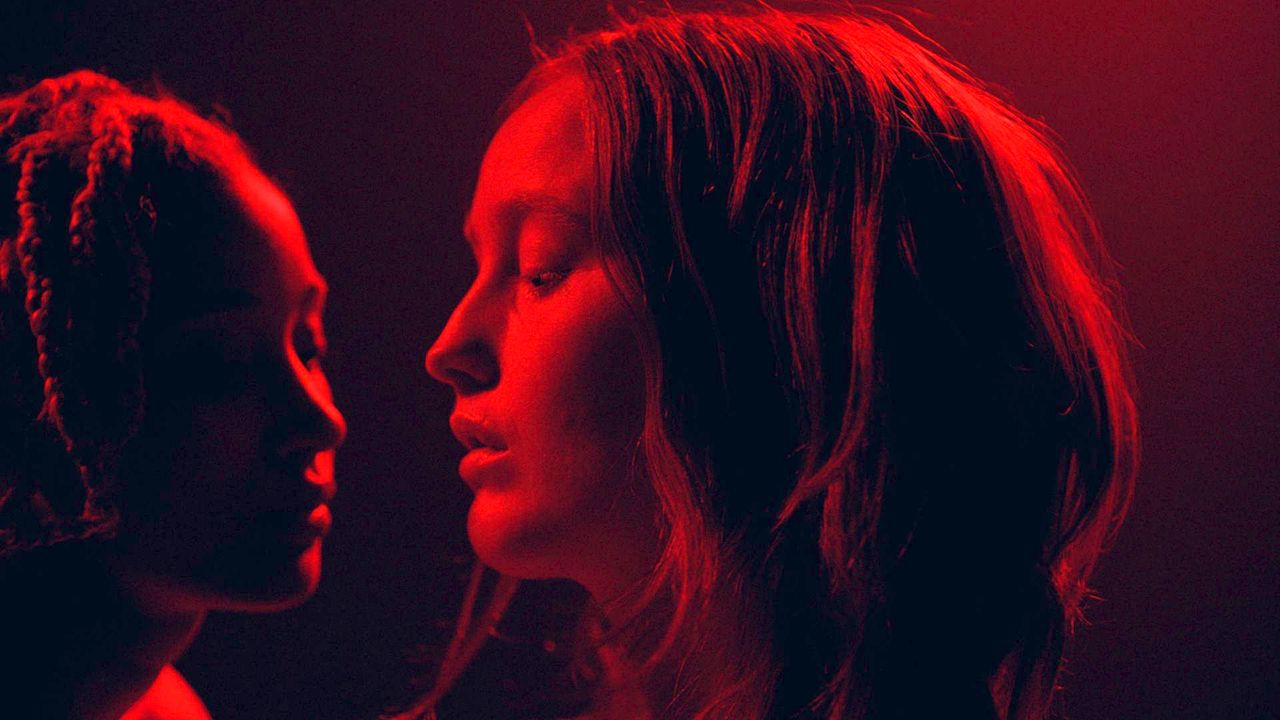Jae Matthews’ initial plan was to work in film when she found success with her band Boy Harsher and she became a full-time musician with bandmate Augustus Muller. But in 2016, a personal tragedy took her back in time and forced her to revisit defining moments in her youth. In an effort to process the feelings this experience evoked, she put pen to paper and now, years later, the page has translated to screen with her feature debut My Animal.
Blending coming-of-age with horror, romance, and the supernatural, the film tells the story of teenage hockey goalie Heather (Bobbi Salvör Menuez) who endures a quiet existence in a small town. Haunted by a generational family curse, her ability to lead a “normal” life is compromised by forces outside her control – that is until she meets a beautiful figure skater worth risking it all for.
Directed by Jacqueline Castel, My Animal premiered at the 2023 Sundance Film Festival. I spoke with Jae Matthews about the film and its progression from notes jotted down as a teenager to the big screen – and what it was like to hand over the reins of a story so close to home.
I understand this was a personal story for you. Tell me its origins and the journey to getting it made as a film.
Yes, it’s a very personal story. I started it at the end of 2016 and completion probably happened in early 2017. In late 2016, my step dad suddenly died of a heart attack. I had to return home to pick up the pieces and check on my mom.
For the first time in a long time, I had to sleep in my childhood bedroom in this home I grew up in and from which I had since moved away. I was living in Georgia for many years, and out of nowhere, I was back in upstate New York in the middle of winter. A lot of the remnants of my high school were in my drawers… and angst was in the room. I found pieces of paper where I was collecting all these thoughts. I was never really a diary person, but I truly am just a nutty, write down on any piece of paper you can find, type person. And then put it in a pile.
I found all these piles and it wasn’t really a revelation, but in high school I was fixated and absolutely in love with my best friend. It was like entering into a zone and being enveloped by this historical moment in my own life, a very personal history. It was incredibly stressful being there and coming to terms with my mom, who was a lifelong alcoholic and deteriorating. I would walk to the local bar and sit there all alone, feeling a lot of anger. I wanted to be able to transform and become something really ugly and aggressive, something that could enact violence on everything, especially on the things that were hurting me. I obviously didn’t want to hurt my mom, but I definitely wanted to destroy the world that created her.

Jae Matthews. Photo by Shannon Greer
And so that is exactly where My Animal came from – that was the first scene I wrote, about this woman sitting at a bar watching the clock and something’s really ticking her off. I then expanded it into this feature, I think in order to just get the world out of me. But that was the end of it. I put it down and it was very surprising when someone hit me up and said, “I want to option this.”
How did you approach blending a supernatural element into a coming-of-age story?
It was about wanting to figure out how the character could manifest that rage – how can you become the thing that is as violent as you want to be? It was partially that, but it also really connected to the experience of the character’s queerness and sexual awakening. There’s something within you that you cannot tamper with, you cannot totally distinguish. If you attempt to, it’s only going to bubble up more.
I think that the werewolf analogy, for me, was about relating to my queerness as a shameful experience. You don’t transform into a beautiful thing – you transform into a werewolf. When I wrote it initially, the characters would transform into dogs. I think that that metaphor is one that is attempting to describe coming into acceptance or awareness of your sexuality and yourself as a sexual person.
How did you connect with Jacqueline Castel and what made her the right person to direct this film written from such a personal space?
My full-time job is that I’m a touring musician, and I’m often on the road. When you’re on tour, it’s like your life stops at home. You’re just not there. I had forgotten this, but I guess at one point in 2017, I had shared the script with my writing partner and friend Alireza Khatami. I found the e-mail I sent, the subject line was, “How bad does this suck?”
I sent it to him and then left on tour. While I was away, he read it and really liked it. He texted me asking if it was cool if he shared it with his other friend. I’m on tour, I have no idea what the implications of that are and I just said, “Yeah, I don’t care. I’m happy that you think it’s cool writing”. I was just happy that I had shared something that wasn’t embarrassingly bad.
Maybe a year later, kind of out of the blue, I was contacted by Canadian producers Michael Solomon and Aonan Yang; they were the ones that Ali had shared the script with. I hadn’t realized he was sharing it with producers who were looking for projects; they were really interested and wanted to meet me.
I didn’t write this with the idea that it would be produced. I think that in some future world I thought, “Yeah, My Animal… I love it.” Maybe I’ll make it twenty years from now or something, when I’m ready. But they wanted to put the project together. I was hesitant because it is very personal – I was hesitant to rescind control. I think that’s the ultimate lesson for screenwriters – you have to accept that your story is about to be totally mutated and reinterpreted. Which is really crazy, you know?
They had a director in mind and I remember meeting Jacqueline in New York. We talked for a long time and I felt like she got where it was coming from. She also understood the insecurity I had about sharing this. And so, very hesitantly, I did an option deal – and a short one too. But then they asked me if I would come up with them to Fantasia in Montreal. I did and we pitched the movie. Something about that experience made me realize, “OK Jae, you are a part of this… this is your story. So either bail or really commit…don’t exist in a grey area.” After that, I extended my option and hoped that we would be greenlit; a week before that second option was about to expire, it happened.
The whole trajectory to me is nuts because I wasn’t really part of the process in the way that the producers and the director were intimately involved in trying to make it happen. I was in the background saying, “I’m lighting a candle.”
What was the experience at Sundance like for you?
Incredible… strange… kind of heartbreaking. The first time I saw the film was at Sundance, at the premiere, in a room with maybe four hundred people. At that point, I hadn’t read the script in a while. I wasn’t on set. I was no part of production. I was no real part of pre-production even. So, I took a huge step back and intentionally didn’t reread it. I just thought, “Let’s go in and see it as a movie and see what it’s like?”\

Heather (Bobbi Salvör Menuez) Photo courtesy of Byrn McCashin
There are some moments that are so painful and really raw. I thought to myself, “You were going through it…you’re still going through it.” It still hits you as hard and certain things made me cry out of complete joy, which was a new experience. It’s cool to see it happen, translate from written word into acting. I wanted to see that interpretation. I wanted to see the actor take the look and add the meaning to it. That’s a long-winded way to say it was a big, big experience.
Was it difficult to intertwine horror and romance or did it flow quite easily?
It flowed pretty naturally while I was writing it… but I do think I was writing in a very undisciplined way. “Don’t worry about the arcs, don’t worry about the structure, just get it out there in the way that feels the most natural to you.” If you’re writing the story, just go wherever the story goes. I know there are multiple camps in terms of how to develop one’s feature. I tend to do it that way, but I also understand that it makes it much harder in the long run when you’re redrafting.
So when I went into redrafting with Jacqueline, that was challenging. I didn’t want to change certain things. But Jacqueline would say, “We’re making this a movie, so it actually has to have structure”. We had to translate it into things like character arcs and three-act structure.
I think that the challenge during the redrafting period also came from attempting to integrate more of the werewolf mythology into the story. Truly, when I was writing it, it wasn’t about that. I know some films really lean into the mythos – what’s the history, where did it come from, how do you get ride of it and so on. But this was such a metaphor already. I’m not really interested in playing that game or explaining away the horror legacy, which may be disappointing for some. But at the same time, I hope that they’re able to take away what’s actually the more interesting thing to me, which is the theme of sexuality and shame and how that can really relate to violence.
What, if anything, did you take from your career as a musician into your role as a screenwriter? And what role does music play in the film?
My hope to be a screenwriter happened before I became a functional professional musician. The “Jae trajectory” is kind of confusing because I was never really investing into music as my career and then it actually ultimately did become my career.
I don’t think that my career as a musician will play into screenwriting except for the fact that I do think I could write a really killer script about a touring band! I just need to figure out how to make it not boring because touring is awesome and amazing and exciting, but it’s also incredibly boring.
The type of music I make is dark wave. It’s electronic music. And so, for horror buffs, it really does lean into the ethos of, say, John Carpenter. I did have this kind of pulsing, tonal, very eerie score attached to it. I didn’t write the score, but my bandmate Augustus Muller did. I knew he would be up for the challenge, because so much of our music is about evoking a feeling of desire or lust or fear. When he was working on the film, it just made sense. It was cool and I think it celebrates the music in a way that’s unexpected.

